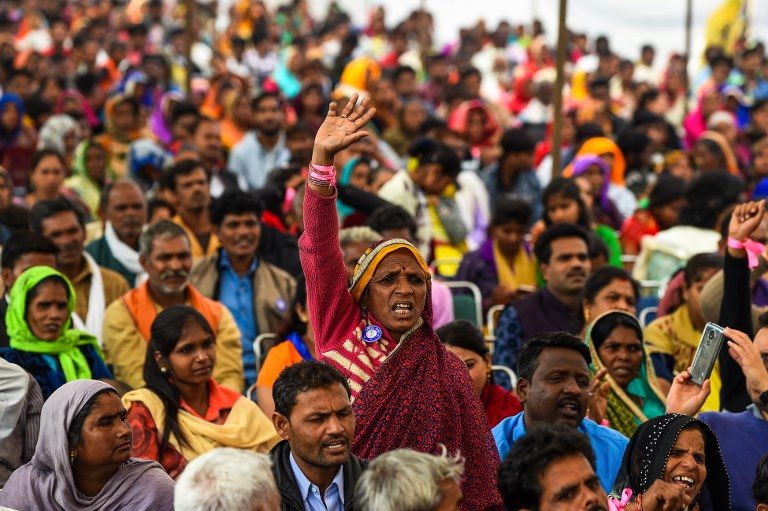SUMMARY
This is AI generated summarization, which may have errors. For context, always refer to the full article.

NEW DELHI, India – Teju Bai walked for a month to join a rally in India’s capital by thousands of sexual assault survivors who came together in public for the first time to demand justice.
Bai’s daughter-in-law was raped last year. The young woman has been shamed and remains a target for abuse while her attacker remains free, she said.
Sexual assault has become a tinderbox social issue in India after the horrific rape and killing of a student on a New Delhi bus in 2012 that made global headlines.
Changes were promised, but for many, the shaming and blaming of victims remains relentless.
Bai said she, her son, and his wife – the victim – had to leave their village in the central state of Madhya Pradesh after the young woman was accused of “enticing men” while her husband was away.
“The villagers ostracized us and called my daughter-in-law names,” said Bai who was joined by her son and his wife at Friday’s Dignity March, February 22, alongside 5,000 other people.
The husband, Kanwar Lal, said the attacker barged into their house one night, repeatedly raped his wife and warned her to not tell anyone.
“She trusts and loves me and I have promised to fight for her,” he told AFP.
“The fault lies with the rapist and not with the survivor.”
Lal’s words are at odds with prevailing attitudes in India, despite outrage over the bus attack which sparked weeks of protests and eventually a change in the law to introduce the death penalty for rape.
Politicians and religious leaders had at first blamed the student for the crime.
Even one of the perpetrators of the 2012 attack blamed his victim, saying women who went out late at the night attracted men.
“A girl is far more responsible for rape than a boy,” he said, as he and other defendants fought a last court battle to escape capital punishment.
‘End the stigma’
Mahinder Singh travelled for a month with demonstrators, who covered some 10,000 kilometres around India to highlight the cause before arriving in Delhi.
“I have come to support this attempt to end the stigma surrounding rape victims,” said Singh, from Madhya Pradesh state, whose sister was attacked in 2017.
“My sister is innocent but she’s been punished by society for being a rape survivor.”
It took a year for police to catch the attacker and the man was acquitted at trial last year for lack of proof.
Singh alleged that police had “accepted bribes” from the defendant and since the end of the trial his family had faced death threats.
In rural India’s largely patriarchal system, powerful men often use sexual violence to control or oppress poorer classes or India’s marginalized lower-castes.
Unelected but powerful caste or village councils often adjudicate rape cases, “punishing” perpetrators with small fines or simple verbal reprimands.
Nearly 1.4 million crimes against women were reported in the past 5 years. Of the 325,000 reported in 2016, 36,500 were rape cases.
Experts say that official figures are just the tip of the iceberg as many survivors prefer not to come forward.
Many are shunned by their families and friends if they do, leaving them to fend for themselves.
“Survivors face shame in the community, from their family, from their relatives. Perpetrators get lots of support,” said Asif Shaikh, an organizer of the march.
The organizers have set up a national network of victims to press their campaign for change.
Bhanwari Devi, a 60-year-old from a small village in Rajasthan state, said her decades-old struggle had echoes in the #MeToo campaign that has tainted Hollywood and big business figures around the world.
Devi was gang-raped by 5 men from a powerful upper-caste community after she stopped a child marriage in the village.
The rape made national headlines after she made her story public. But her attackers are still free.
“We don’t have to remain silent. We have to raise our voice and not be scared,” Devi said. – Rappler.com
Add a comment
How does this make you feel?
There are no comments yet. Add your comment to start the conversation.